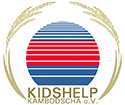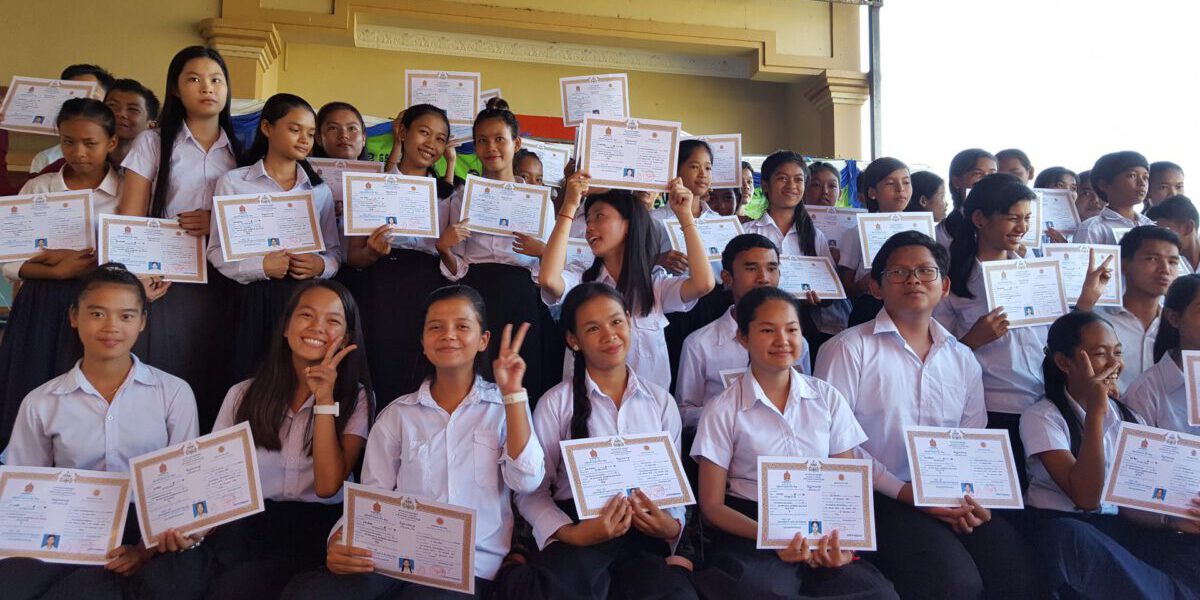As an organisation committed to improving the educational situation in Cambodia, we would like to ensure that more Cambodians are able to take advantage of the educational opportunities offered by the state. To achieve this, we run a sponsorship program for school age children and young people from poor families.
The civil war in the 1970’s and its aftermath led to many of today’s parents or grandparents being illiterate, which is one of the reasons they do not value education as much as other Asian countries. In addition, many children and young people often have to help out at home because the family income is otherwise not sufficient to support everyone. Only about 80% of all children finish primary school (1st to 6th year) with the figures being worse for the higher age groups. Only about 40% finish ninth grade and only one in five graduates from high school[i].
The sponsored children receive US$ 12 per month from us [ii]. This money gives their families an incentive to send the children to school and enables them to purchase school materials. During the monthly pay-outs of the sponsorship money, our local employees check the attendance school books of the sponsored children. The head teacher enters the days of absence and the grades of each child in a booklet. If a sponsored child does not show up to collect the money or if the booklet shows irregularities, we contact the families and teachers and ask for possible reasons. Depending on the situation, we can then either give the all-clear (e.g. if the child was travelling at the time of payment), provide additional help and support to the family (e.g. if the child is ill) or we have to terminate the sponsorship. The latter only happens when a child has finished high school or when we find that he or she has dropped out of school prematurely.
We would like to clearly point out that US$ 12 per month can only be a small financial incentive for the families to send their child to school. In addition to this incentive, the inclusion of a child in the sponsorship program gives us the opportunity to establish contact with a family and enter into a dialogue on the subject of education. Many parents have never had the opportunity to go to school themselves and therefore do not understand why it is important to graduate. In the conversations we have with them and the children, we therefore try to show the opportunities that a good education enables.
Nevertheless, it must clearly be stated that US$ 12 per month and the advice we give is not always sufficient to keep a child in school. There is no government social security system in Cambodia.
Also, alimony payments for illegitimate children or for children that are left with one parent after a divorce are rarely made. Only rich Cambodians in the cities have any form of medical or life insurance. If a main breadwinner leaves the family, for example due to accident, illness, separation or death, oftentimes one or more of the oldest children must step in and become the main bread earner. US$ 12 cannot replace an income. In rural areas, this income is now at least US$ 100 per capita per month. Nevertheless, there is sometimes a middle way. The contact we establish with the families through the sponsorships enables us to seek dialogue as soon as we learn of a crisis. We then try to find ways to ensure that the basic needs of the family are met and that the child can continue to go to school. The sponsors will be informed about such developments in a timely manner. If a sponsored child does leave the program, we write a final report with the reasons for the school drop-out and send it to the sponsors.
If you would like to sponsor a child please complete a Child Sponsorship Form and if you are a UK tax payer, a Charity Gift Aid Form and contact Patrick@kidshelp-kambodscha.org for UK bank details.
Information about further possibilities to support us can be found here.
[i] Source: MINISTRY OF EDUCATION, YOUTH AND SPORT: Public Education Statistics & Indicators 2016 – 2017. Stand 18.06.2019
[ii] The sponsorship costs 17 Euro per month. The remaining amount will be used to finance our administrative costs. If we generate surpluses, these will be reinvested for statutory purposes.



